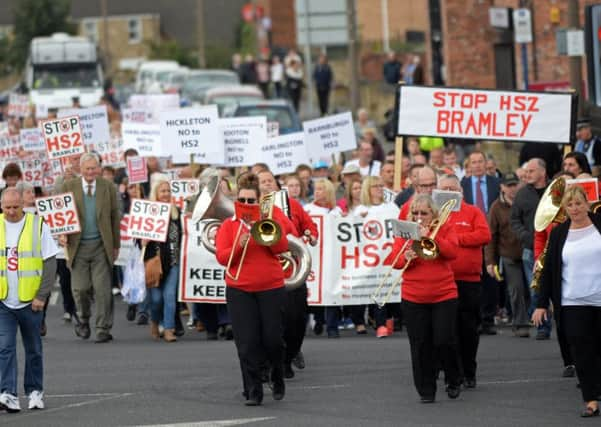David Behrens: Your London service terminates early '“ but HS2 gravy train rolls on


Come next year, many of the trains from Yorkshire to the capital will drop you off instead at Peterborough, which is around 90 miles from King’s Cross. It makes the airport fancifully known as London Luton seem positively metropolitan.
The reason for this is the wholesale upgrading of King’s Cross itself, which will see all its platforms closed for entire weekends at a time. You will not need reminding that a “weekend” in Network Rail parlance runs well into the following Tuesday.
Advertisement
Hide AdAdvertisement
Hide AdThe upheaval will make leisure trips between Yorkshire and London virtually impossible during the affected periods – which include the summer months when southern tourists might otherwise have come here to take in our scenery.
But, while I do not for a moment take Network Rail at face value when it says it will keep disruption to a minimum, I can’t dispute that the £250m worth of upgrades to the tracks and signals it proposes are necessary if, as it says, journey times are to be shortened and capacity at the station increased.
But, hang on… are those not the same benefits that the infinitely more expensive HS2 project is supposed to deliver?
Advertisement
Hide AdAdvertisement
Hide AdThe collective clutching at straws by executives and politicians was almost audible last week as the fallout from HS2’s estimate of how many communities its new high speed line will rip up, began to be felt.
Suddenly, speed was not the issue after all; it was increased capacity the nation needed. Space, it was said by Leeds Council and others, could be freed to move goods traffic off the motorways and back on to the rails.
But is that likely? The freight industry has invested billions in fleets of vehicles and loading facilities on slip roads. Its systems work a darn sight more efficiently than the rail network, and they are not likely to be abandoned simply because Leeds Council thinks it should use the trains instead.
Advertisement
Hide AdAdvertisement
Hide AdBesides, any imagined reduction in HGV traffic will apply to motorways only, and mostly just to the M1. The lorries that radiate outwards will continue, unaffected, to their destinations.
At the core of the Leeds argument is the assertion that HS2 would be good for the environment. But it conveniently ignores the fact that there is a second, greener, high speed proposal out there – the HSUK scheme, which promises to connect more cities, for around £20bn less.
No-one who has taken the train to Liverpool in the last year can be in any doubt about the turmoil the upgrade to King’s Cross will cause. Lime Street Station was the beneficiary of its biggest investment since the 19th century – a sign of how little there had been in the 20th – and the scale in north London is many times greater.
The disruption will also overshadow the introduction of new trains on the East Coast Main Line – whose testing has, in any case, been halted because they interfere with the signalling.
Advertisement
Hide AdAdvertisement
Hide AdBut the upgrade is already a work in progress; a new concourse at King’s Cross, four times the size of the old one, was completed six years ago. Taken together, the new trains, tracks, signals and terminus will deliver enough of what HS2 promises to emasculate the remaining arguments in its favour.
Certainly, as I intimated last week, its benefits are vastly outweighed by the financial and human cost of ripping up communities to make way for it.
Given the weight of distrust and downright derision that surrounds the project, one might wonder why anyone is still in arguing its corner. But here is a case where money, quite literally, talks – because its cheerleaders are public servants with a vested interest in its continued existence.
HS2 Limited, which is Government-owned and taxpayer-funded, paid six-figure salaries to no fewer than 318 of its employees last year – around twice as many as the year before. It also doubled its spending on consultants, to £600m. All this so we can look forward to a generation of HS2 bus replacement services because there’s a cow on the line near Grantham.
It’s a big, fat gravy train, and it’s no surprise that they don’t want to have to get off it at Peterborough.